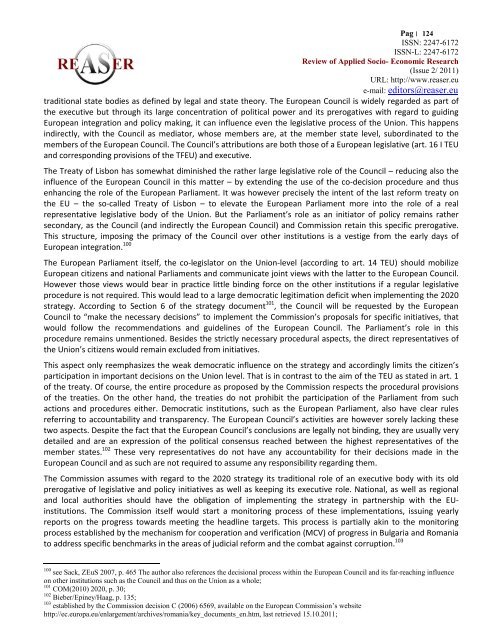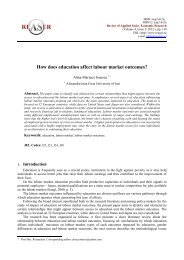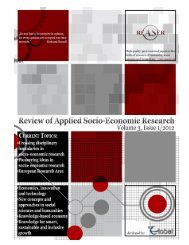Volume 2, ISSUE2/2011 - Review of Applied Socio-Economic ...
Volume 2, ISSUE2/2011 - Review of Applied Socio-Economic ...
Volume 2, ISSUE2/2011 - Review of Applied Socio-Economic ...
You also want an ePaper? Increase the reach of your titles
YUMPU automatically turns print PDFs into web optimized ePapers that Google loves.
Pag׀ 124 ISSN: 2247-6172ISSN-L: 2247-6172<strong>Review</strong> <strong>of</strong> <strong>Applied</strong> <strong>Socio</strong>- <strong>Economic</strong> Research(Issue 2/ <strong>2011</strong>)URL: http://www.reaser.eue-mail: editors@reaser.eutraditional state bodies as defined by legal and state theory. The European Council is widely regarded as part <strong>of</strong>the executive but through its large concentration <strong>of</strong> political power and its prerogatives with regard to guidingEuropean integration and policy making, it can influence even the legislative process <strong>of</strong> the Union. This happensindirectly, with the Council as mediator, whose members are, at the member state level, subordinated to themembers <strong>of</strong> the European Council. The Council’s attributions are both those <strong>of</strong> a European legislative (art. 16 I TEUand corresponding provisions <strong>of</strong> the TFEU) and executive.The Treaty <strong>of</strong> Lisbon has somewhat diminished the rather large legislative role <strong>of</strong> the Council – reducing also theinfluence <strong>of</strong> the European Council in this matter – by extending the use <strong>of</strong> the co-decision procedure and thusenhancing the role <strong>of</strong> the European Parliament. It was however precisely the intent <strong>of</strong> the last reform treaty onthe EU – the so-called Treaty <strong>of</strong> Lisbon – to elevate the European Parliament more into the role <strong>of</strong> a realrepresentative legislative body <strong>of</strong> the Union. But the Parliament’s role as an initiator <strong>of</strong> policy remains rathersecondary, as the Council (and indirectly the European Council) and Commission retain this specific prerogative.This structure, imposing the primacy <strong>of</strong> the Council over other institutions is a vestige from the early days <strong>of</strong>European integration. 100The European Parliament itself, the co-legislator on the Union-level (according to art. 14 TEU) should mobilizeEuropean citizens and national Parliaments and communicate joint views with the latter to the European Council.However those views would bear in practice little binding force on the other institutions if a regular legislativeprocedure is not required. This would lead to a large democratic legitimation deficit when implementing the 2020strategy. According to Section 6 <strong>of</strong> the strategy document 101 , the Council will be requested by the EuropeanCouncil to “make the necessary decisions” to implement the Commission’s proposals for specific initiatives, thatwould follow the recommendations and guidelines <strong>of</strong> the European Council. The Parliament’s role in thisprocedure remains unmentioned. Besides the strictly necessary procedural aspects, the direct representatives <strong>of</strong>the Union’s citizens would remain excluded from initiatives.This aspect only reemphasizes the weak democratic influence on the strategy and accordingly limits the citizen’sparticipation in important decisions on the Union level. That is in contrast to the aim <strong>of</strong> the TEU as stated in art. 1<strong>of</strong> the treaty. Of course, the entire procedure as proposed by the Commission respects the procedural provisions<strong>of</strong> the treaties. On the other hand, the treaties do not prohibit the participation <strong>of</strong> the Parliament from suchactions and procedures either. Democratic institutions, such as the European Parliament, also have clear rulesreferring to accountability and transparency. The European Council’s activities are however sorely lacking thesetwo aspects. Despite the fact that the European Council’s conclusions are legally not binding, they are usually verydetailed and are an expression <strong>of</strong> the political consensus reached between the highest representatives <strong>of</strong> themember states. 102 These very representatives do not have any accountability for their decisions made in theEuropean Council and as such are not required to assume any responsibility regarding them.The Commission assumes with regard to the 2020 strategy its traditional role <strong>of</strong> an executive body with its oldprerogative <strong>of</strong> legislative and policy initiatives as well as keeping its executive role. National, as well as regionaland local authorities should have the obligation <strong>of</strong> implementing the strategy in partnership with the EUinstitutions.The Commission itself would start a monitoring process <strong>of</strong> these implementations, issuing yearlyreports on the progress towards meeting the headline targets. This process is partially akin to the monitoringprocess established by the mechanism for cooperation and verification (MCV) <strong>of</strong> progress in Bulgaria and Romaniato address specific benchmarks in the areas <strong>of</strong> judicial reform and the combat against corruption. 103100 see Sack, ZEuS 2007, p. 465 The author also references the decisional process within the European Council and its far-reaching influenceon other institutions such as the Council and thus on the Union as a whole;101 COM(2010) 2020, p. 30;102 Bieber/Epiney/Haag, p. 135;103 established by the Commission decision C (2006) 6569, available on the European Commission’s websitehttp://ec.europa.eu/enlargement/archives/romania/key_documents_en.htm, last retrieved 15.10.<strong>2011</strong>;








